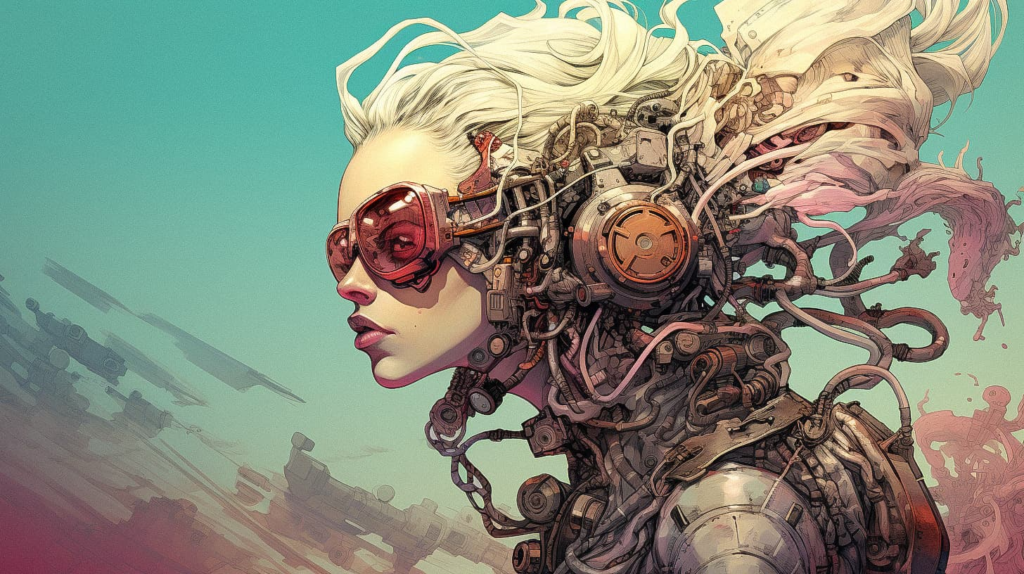In the vast galaxy of literary genres, science fiction stands out as a nebula of creativity, offering a multitude of subgenres that cater to a diverse range of tastes and imaginations. Whether you’re a fan of futuristic dystopias, mind-bending cyberpunk, or epic space operas, the world of science fiction has something for everyone. In this journey through the cosmos of speculative fiction, we’ll delve into seven captivating sci-fi subgenres, tracing their origins, key developments, and showcasing influential books and authors.
What is Science Fiction?
Science fiction, often abbreviated as sci-fi, is a genre of speculative fiction that explores imaginative and futuristic concepts that are often based on scientific principles, discoveries, and technologies. It dares to ask “What if?” and takes readers on journeys beyond the boundaries of our current knowledge, exploring the potential consequences of scientific and technological advancements.
Sci-fi is characterized by its ability to transport readers to other worlds, both real and imagined, and to challenge our understanding of the universe and ourselves. It’s a genre where creativity knows no bounds, and the only limit is the author’s imagination.
The Genesis of Science Fiction
Science fiction’s roots can be traced back to ancient myths and legends that envisioned extraordinary beings and otherworldly realms. However, as a distinct literary genre, it emerged during the 19th century, a period marked by rapid scientific and technological advancements. Here’s a brief historical overview of the genre’s evolution:
19th Century: The Birth of Sci-Fi
The 19th century witnessed the birth of science fiction as a genre separate from fantasy. Pioneering authors like Jules Verne, often called the “Father of Science Fiction,” took readers on fantastical journeys through novels like “Twenty Thousand Leagues Under the Sea” (1870) and “Journey to the Center of the Earth” (1864). These works combined scientific knowledge with imaginative storytelling, setting the stage for what was to come.
Early 20th Century: The Golden Age
The early 20th century marked the golden age of science fiction. Influential pulp magazines like “Amazing Stories” (1926) provided a platform for writers such as H.G. Wells, Isaac Asimov, and Arthur C. Clarke to explore complex scientific concepts and futuristic scenarios. Wells’ “The War of the Worlds” (1898) and Asimov’s “Foundation” series (1951) are enduring classics from this era.
Mid to Late 20th Century: The New Wave and Beyond
The mid-20th century saw the emergence of the “New Wave” movement, characterized by experimental and socially conscious sci-fi. Authors like Philip K. Dick (“Do Androids Dream of Electric Sheep?” – 1968) and Ursula K. Le Guin (“The Left Hand of Darkness” – 1969) pushed the boundaries of the genre, exploring themes of identity, consciousness, and the human condition.
1. Dystopian Science Fiction
Defining Dystopian Sci-Fi
Dystopian science fiction presents a bleak vision of the future, often characterized by totalitarian regimes, oppressive social systems, and a world in decay. It explores the darker side of humanity and the consequences of unchecked power and technology.
A Glimpse into the Dystopian Realm
Influential Books and Authors:
- George Orwell‘s “Nineteen Eighty-Four” (1949) is a cornerstone of dystopian literature, portraying a nightmarish surveillance state.
- Margaret Atwood‘s “The Handmaid’s Tale” (1985) envisions a theocratic regime where women’s rights are stripped away.
- Aldous Huxley‘s “Brave New World” (1932) explores a society controlled by pleasure and conformity.

2. Cyberpunk
Defining Cyberpunk
Cyberpunk is a subgenre of science fiction that combines high-tech, futuristic settings with gritty, dystopian elements. It often explores the intersection of technology, cybernetics, and human nature, blurring the lines between man and machine.
A Glimpse into the Cyberpunk Realm
Influential Books and Authors:
- William Gibson‘s “Neuromancer” (1984) is a seminal work that introduced the concept of “cyberspace” and hacker culture.
- Philip K. Dick‘s “Do Androids Dream of Electric Sheep?” (1968) served as the basis for the iconic film “Blade Runner.”
3. Space Opera
Defining Space Opera
Space opera is the grand, epic side of science fiction, often set in sprawling interstellar civilizations and featuring larger-than-life heroes and villains. It’s known for its adventurous spirit, intricate political landscapes, and battles on a cosmic scale.

A Glimpse into the Space Opera Realm
Influential Books and Authors:
- Isaac Asimov‘s “Foundation” series (1951) explores the rise and fall of a galactic empire.
- Frank Herbert‘s “Dune” (1965) weaves a rich tapestry of political intrigue on a desert planet.
4. Hard Science Fiction
Defining Hard Sci-Fi
Hard science fiction focuses on scientific accuracy and realism. It delves deep into scientific principles and technologies, often predicting future advancements with precision.
A Glimpse into the Hard Sci-Fi Realm
Influential Books and Authors:
- Arthur C. Clarke‘s “2001: A Space Odyssey” (1968) is a masterpiece of hard sci-fi, exploring themes of evolution and extraterrestrial life.
- Kim Stanley Robinson‘s “Mars Trilogy” (1990s) meticulously portrays the colonization and terraforming of Mars.
5. Time Travel
Defining Time Travel Sci-Fi
Time travel science fiction explores the concept of moving backward or forward in time. It often delves into the complexities of causality and the butterfly effect.
A Glimpse into the Time Travel Realm
Influential Books and Authors:
- H.G. Wells‘s “The Time Machine” (1895) is a pioneering work that popularized the concept of time travel.
- Ray Bradbury‘s “A Sound of Thunder” (1952) explores the profound consequences of altering the past.
6. Steampunk
Defining Steampunk
Steampunk is a subgenre that reimagines history with steam-powered technology, often set in Victorian or Edwardian eras. It combines the aesthetics of the past with futuristic innovations.
A Glimpse into the Steampunk Realm
Influential Books and Authors:
- William Gibson and Bruce Sterling‘s “The Difference Engine” (1990) is a seminal work that helped popularize steampunk.
- Scott Westerfeld‘s “Leviathan” series (2009) offers a steampunk take on World War I.
7. Biopunk
Defining Biopunk
Biopunk is a subgenre that explores the intersection of biology, genetics, and biotechnology. It often raises ethical questions about the manipulation of life forms and the consequences of genetic engineering.

A Glimpse into the Biopunk Realm
Influential Books and Authors:
- Paul McAuley‘s “The Quiet War” (2008) delves into a future where genetic engineering plays a central role in human society.
- Paolo Bacigalupi‘s “The Windup Girl” (2009) envisions a world where biotechnology has created new forms of life.
The Ever-Expanding Universe of Sci-Fi Subgenres
Science fiction is a genre that continues to evolve and adapt to the changing landscape of science, technology, and society. From the dystopian nightmares of Orwell to the cybernetic landscapes of Gibson, each subgenre offers a unique lens through which to explore the infinite possibilities of the universe.
As we journey deeper into the 21st century, science fiction remains a powerful tool for contemplating the ethical, social, and existential challenges that lie ahead. It challenges us to confront our fears and hopes for the future, inspiring us to ask, “What lies beyond the stars, and what does it mean to be human in a universe of limitless potential?”
So, whether you’re a fan of dystopian despair, cybernetic thrills, or interstellar epics, there’s a subgenre of science fiction waiting to ignite your imagination and take you on a journey to the farthest reaches of the cosmos. Strap in, fellow explorers, and prepare to embark on a voyage beyond the boundaries of reality.
Explore the cosmos of science fiction, where the only limit is the scope of your imagination. Dive into the worlds of dystopian futures, cybernetic adventures, and interstellar epics. Science fiction’s ever-expanding universe awaits.


